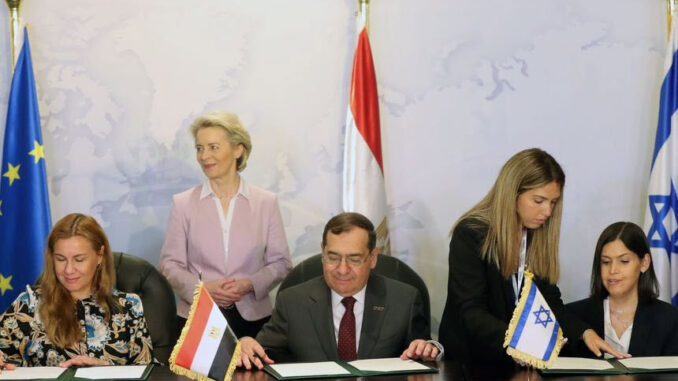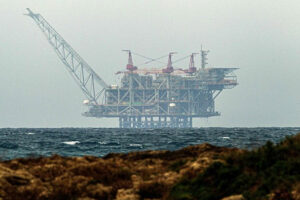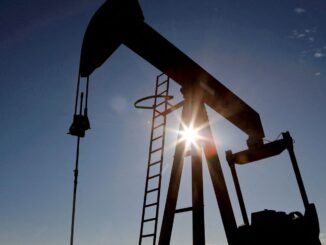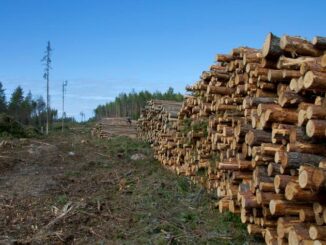
The European Union signed an agreement with Israel and Egypt to boost gas shipments on Wednesday, tapping into the gas riches of the eastern Mediterranean as it races to secure alternatives to Russian energy.
The EU, which for years has relied heavily on Russian gas to power factories and heat homes, is turning to the eastern Mediterranean to help replace Russian fossil fuels after Moscow’s invasion of Ukraine. But the Middle East’s fractious politics and capacity constraints pose challenges.
Under the trilateral deal, Israel will send the natural gas from its vast offshore fields in the eastern Mediterranean via pipeline to Egypt, where it will be liquefied and shipped to Europe, according to European Commission President Ursula von der Leyen, who was in Cairo on Wednesday after visiting Israel earlier this week.
“This will contribute to our energy security,” Ms. von der Leyen tweeted Wednesday.
Ms. von der Leyen didn’t say how much Israeli gas could flow to the 27-country bloc, which received about 40% of its supplies from Russia in recent years. The agreement is valid for three years and will automatically renew for another two years, according to a statement from the Israeli energy ministry.
The EU already receives some gas from Egypt and, analysts say, in the short term, neither Israel nor Egypt have much spare capacity to send a lot more to Europe amid growing domestic demand.
“It’s a positive step at a time of energy crisis, but my sense is we’re only talking about small amounts,” said Simon Henderson, an energy policy fellow at the Washington Institute. “This is going to happen slowly.”
Large natural-gas finds in Israeli, Cypriot and Egyptian exclusive economic zones during the past decade have turned the region into a global energy source. The eastern Mediterranean fields discovered since 2009 hold about two trillion cubic meters of gas altogether, with a similar amount likely to be found in the near future, consulting firm Wood Mackenzie estimated in 2020. Last year, the EU imported about 155 billion cubic meters of gas from Russia.
But a significant increase in gas shipments from this region to Europe would require major long-term infrastructure investments. That money is only likely to be spent if Europe commits to longer-term purchases, which could be an issue as the West pushes toward renewable energy. The EU has set out some of the world’s most ambitious plans to tackle climate change.
Wednesday’s agreement calls on European companies to help increase the production of natural gas in the eastern Mediterranean by competing for exploration and production projects. It also comes with the understanding that in 2030 EU member states would begin to decrease dependency on gas to become zero-emission economies by 2050, according to the Israeli statement.
Egypt’s petroleum minister, Tarek El-Molla, said the agreement was an important step toward achieving more energy cooperation between the main producers, consumers and transit countries in the eastern Mediterranean, including with the EU.
Another option being considered is to revive a pipeline linking the EastMed pipeline, Israeli officials said, an expensive project that would link Israel to Cyprus and Greece—taking its gas to consumers in mainland Europe. However, that pipeline has encountered opposition from the U.S. for environmental reasons and from Turkey, which has its own pipeline to Europe.

PHOTO: JACK GUEZ/AGENCE FRANCE-PRESSE/GETTY IMAGES
Thanks to Egypt’s own gas discoveries as well as its liquefied natural gas facilities, which are expensive to build, Cairo aspires to become the key gas hub for the region. But the populous North African country’s domestic demand has limited its capacity to export. Its exports last year were 8.8 billion cubic meters of gas, according to Pranav Joshi, an analyst at Rystad Energy. Meanwhile, Israel exported 4.23 billion cubic meters of natural gas to Egypt in 2021, according to a report from the Israel energy ministry.
Israel must rely on Egypt to liquefy and ship its natural gas because it doesn’t have the expensive infrastructure needed to do so.
Egypt’s LNG facilities have a total capacity of around 16 billion cubic meters so, in the longer term, as more gas is produced, eastern Mediterranean countries would also need to build new LNG or pipeline infrastructure to support exports.
“Egypt’s playing a quick turnaround role because they have this spare capacity right now,” said Mr. Joshi.
For Israel to get more gas to Egypt’s LNG terminals, it would need to update its undersea pipeline located near the seaside city of Ashkelon and owned by the East Mediterranean Gas Company, one of two pipelines to Egypt currently in use. The other is connected to Egypt via Jordan. Around 40% of Israel’s natural gas exports in 2021 were to Jordan.
Israel also has plans to build a third overland pipeline to Egypt, to be completed earliest at the end 2024.
To increase the amount of gas available for export, Israel will need to extract more gas from its Tamar or Leviathan fields, as well as begin extracting gas from Karish, its northern gas field, the energy ministry spokeswoman said.
Israel is expecting to increase its natural gas production as early as September from its Karish field, where a floating gas rig recently arrived from Singapore. Israeli officials say getting gas from that field is a significant element of any export plan to Europe, but it could be hindered by Lebanese claims that the field is partly in its waters.
Source: WSJ



